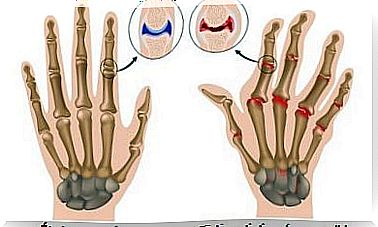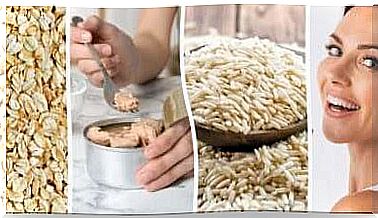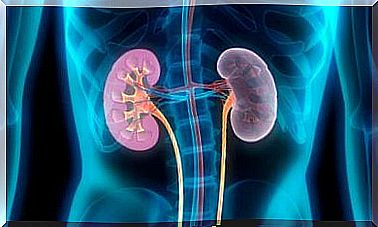Ayurvedic Diet: What Is It And What Are Its Benefits?
An Ayurvedic proverb says: “When food doesn’t work, medicine is useless. When the diet is correct, medicine is not necessary ”. What are the basics and what does food consist of according to this ancestral practice?
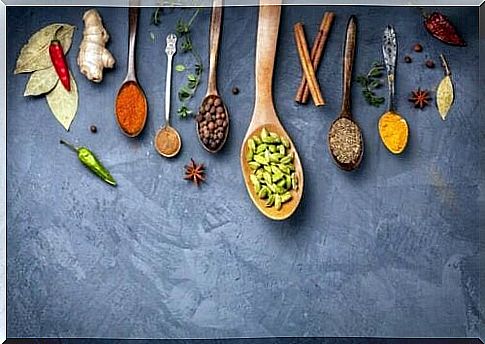
Ayurveda is one of the oldest traditional medicinal practices developing in the Indian subcontinent. It is recognized today as one of the country’s formal health systems and the Ayurvedic diet is one of its pillars.
The word ayurveda , in Sanskrit, means science or knowledge of life. It focuses on good health and disease prevention through lifestyle, massage, meditation, and some herbal remedies. Here we will introduce you to its dietary principles.
What does the Ayurvedic diet consist of?
This diet is more of a healthy way of eating than a system where certain foods are allowed and prohibited. The main objective is to maintain a balance in each person because that is what good health depends on. And these are the foods that help balance.
There are 3 different types of dosha which are defined as a series of attributes that each person has. They are based on aspects such as body composition, character or predominant element. The latter then give the keys to people to develop their life in an optimal way.
The dosha are as follows:
- Vata: quick-witted, flexible and creative. They are generally thin people, who tend to feel cold and have digestive problems as well as difficulty concentrating.
- Pitta: smart, hardworking and firm. Of average constitution, their weak point is none other than inflammation; these are individuals who have a good appetite and do not have digestion problems.
- Kapha: serene and affectionate. Large in size and resistant. These individuals find it difficult to lose weight and often have problems with constipation.
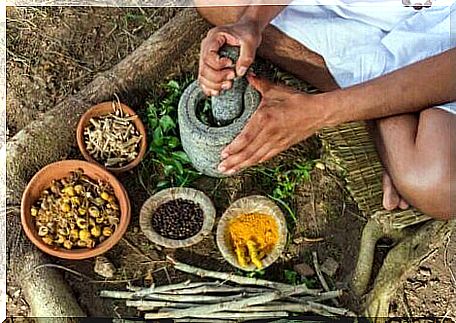
Standards and routines
In addition to following the diet that corresponds to the dominant personality, the Ayurvedic diet is based on a series of standards and routines that must be observed. The most important for all types of people are:
- Eat three meals a day to allow the digestive cycle to end quietly, without interruptions. It is also essential to allow three hours to elapse before going to bed.
- Eat until you are full and don’t wait until your stomach is completely full.
- Prioritize fresh and whole foods.
- Include the six basic flavors in each meal.
- Eat consciously and in a relaxed atmosphere.
Foods allowed and not recommended
In Ayurveda, standards are set about what, how, and when to eat depending on the predominant body type or dosha. There are specific recommendations on the foods that can be included in the daily life, depending on the predominant type (vata, pitta or kapha).
Vata
For these people, the diet should be nutritious, with dishes cooked, at lukewarm temperature and with a very mild seasoning. It is important to maintain regularity in the schedules. The predominant foods should be:
- Oats and rice.
- Eggs, chicken and fish.
- Fermented dairy products.
- Legumes in limited quantities.
- Sweet, ripe and juicy fruits.
- Almonds, nuts and seeds in general. They should be soaked.
- Sesame oil.
- Turmeric, cumin, coriander or ginger for seasoning.
On the other hand, it is necessary to avoid other products:
- Red meat.
- Hard cheeses.
- Astringent and dried fruits, such as cranberries, apples or pomegranates.
- Raw vegetables and mushrooms.
Pitta
In these people, we recommend cold and lightly seasoned meals. Sweet, refreshing and bitter flavors should predominate. Here, a good option would be to follow a vegetarian diet. Foods that should be strengthened are:
- Barley, rice, oats and wheat.
- Chicken and turkey as sources of animal protein.
- Milk, ghee , butter and cheese without salt.
- Legumes in small quantities. The best are black lentils, chickpeas, and mung beans.
- Sweet fruits, such as apples, cranberries and dates.
- Salads and raw vegetables.
- Sunflower seeds and squash from time to time.
- Cardamom, cinnamon, fennel and turmeric.
Foods prohibited for the pitta dominant personality can be summed up through this list:
- Products of animal origin, especially seafood and eggs.
- Red and yellow lentils.
- Acid fruits.
- Tomatoes, radishes, peppers, raw onion and garlic.
- The majority of seeds and dried fruits because they are very oleaginous.
- Hot spices.
Kapha
For the latter dosha, the most recommended diet is one in which hot, light and dry foods predominate. The bitter, astringent and pungent flavor is preferred here. Here is the list of the most recommended foods for these people:
- Buckwheat wheat and millet.
- Chicken, rabbit and seafood with dry cooking (baked or grilled).
- Ghee and goat milk.
- Red lentils, black beans and mung.
- Mango, peach, apricot and pear.
- Vegetables grown on the ground, especially those with green leaves (spinach, chard or cabbage).
- Squash and sunflower seeds in small quantities.
- All types of spices, especially garlic and ginger.
It is necessary to avoid the following products:
- Sweet potatoes, oats and wheat.
- Any type of dairy and fat, especially fried foods.
- Very sweet or sour fruits.
- Root vegetables, such as turnips, beets or radishes.
- Seeds and dried fruits in general.
- All sweeteners and salt.

The pros and cons of the Ayurvedic diet
The set of routines and foods that are part of the Ayurvedic diet are intended to improve the state of health in a broad sense. Thanks to them, we can deduce a whole series of strengths and benefits provided by this type of diet:
- It promotes healthy eating because its basis consists of fresh foods cooked in a simple way.
- Foods of plant origin predominate and have positive effects on disease prevention.
- It promotes conscious eating.
- It is accompanied by a healthy lifestyle.
- This diet can lead to a balanced body weight, good digestion, a better lipid profile and a lower risk of suffering from chronic diseases.
It is nevertheless necessary to mention a series of weak points that must be taken into account when starting to follow this type of diet:
- It’s not just about eating and avoiding a series of foods: you have to keep in mind all the routines that come with it and respect them in the same way.
- It may be difficult to buy certain products and adapt to their flavor.
- Sometimes it takes more commitment because the way of cooking and preparation is very important.
Recommendations for establishing an Ayurvedic diet
Before starting the Ayurvedic diet, it is important to consult a specialist. It is he who must determine the dosha of each person and establish the possible existing problems or imbalances, which should be treated with the diet.
It is necessary to be well organized in order to be able to follow the routines because they are fundamental. People who follow the Ayurvedic diet must take time to adapt themselves, both for new habits and for unusual foods.




